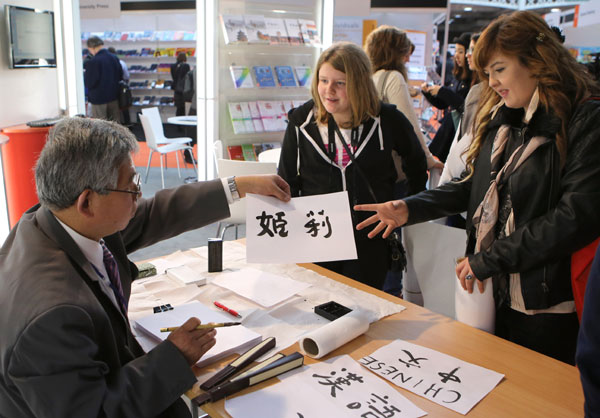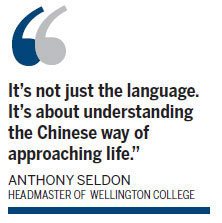Chinese classes in the UK need more teachers
Updated: 2013-02-08 09:00
By Cecily Liu (China Daily)
|
||||||||
 |
|
A Chinese teacher from the Confucius Institute shows Chinese characters to visitors to the London Olympic Exhibition Center on Oct 19. Yin Gang / Xinhua |
Students reluctant to learn Mandarin because they fear it will be too difficult.
A perception that Mandarin is difficult to learn and a shortage of skilled Mandarin teachers in the United Kingdom has led to the language being taught at very few British schools, education experts in the country say.
The issue came into the public spotlight on Monday when a survey commissioned by the British Council and HSBC Holdings PLC showed that only 3 percent of primary school teachers and 9 percent of secondary school teachers say that their schools offer Mandarin lessons. The poll questioned more than 800 teachers in the UK.
Confucius Institutes are nonprofit organizations affiliated with Western academic institutions, including secondary schools and universities.
"There is a common perception among UK students that Mandarin is difficult to learn, and this is partly due to the way lessons are structured in the textbooks," Chao said.
She said that currently most of the Mandarin curricula designed for UK classrooms are divided into different lessons based on scenarios - for example, eating out, numbers or going to school.
"This structure helps to make students interested in the lessons, but there is no natural progression from easy lessons to difficult lessons. For example, the word for 'like' appears fairly early in the textbook, but it is a very hard word to write. So maybe the curriculum should not ask students to write this word so early in their learning," she said.
She believes it is important to first teach students pinyin, the transliteration system for writing Mandarin with the Roman alphabet, and then learn the basic strokes and simple components that make up Chinese characters.
Chao says that the Liverpool Confucius Institute works with about 30 primary and secondary schools on Mandarin learning. Apart from Chao, the institute has four other Mandarin language teachers sent by the Confucius Institute headquarters, Hanban, from China to the UK. They will either go to the affiliated schools to teach, or invite students to classes on the university's campus.
But Chao says only about two or three of these schools actually have Mandarin as a curriculum class, with class sizes varying from about four students to more than 10.
Despite a general interest in learning Mandarin, British students are still reluctant to commit to learning it in curriculum classes, where their grades affect their chances of gaining a university placement.
Last year, 2,541 British students took General Certificate of Secondary Education Mandarin Chinese, which is the examination for 16-year-old secondary school students. In comparison, 72,606 students took GCSE Spanish last year, up from 66,021 the year before.

 Li Na on Time cover, makes influential 100 list
Li Na on Time cover, makes influential 100 list
 FBI releases photos of 2 Boston bombings suspects
FBI releases photos of 2 Boston bombings suspects
 World's wackiest hairstyles
World's wackiest hairstyles
 Sandstorms strike Northwest China
Sandstorms strike Northwest China
 Never-seen photos of Madonna on display
Never-seen photos of Madonna on display
 H7N9 outbreak linked to waterfowl migration
H7N9 outbreak linked to waterfowl migration
 Dozens feared dead in Texas plant blast
Dozens feared dead in Texas plant blast
 Venezuelan court rules out manual votes counting
Venezuelan court rules out manual votes counting
Most Viewed
Editor's Picks

|

|

|

|

|

|
Today's Top News
Boston bombing suspect reported cornered on boat
7.0-magnitude quake hits Sichuan
Cross-talk artist helps to spread the word
'Green' awareness levels drop in Beijing
Palace Museum spruces up
First couple on Time's list of most influential
H7N9 flu transmission studied
Trading channels 'need to broaden'
US Weekly

|

|








